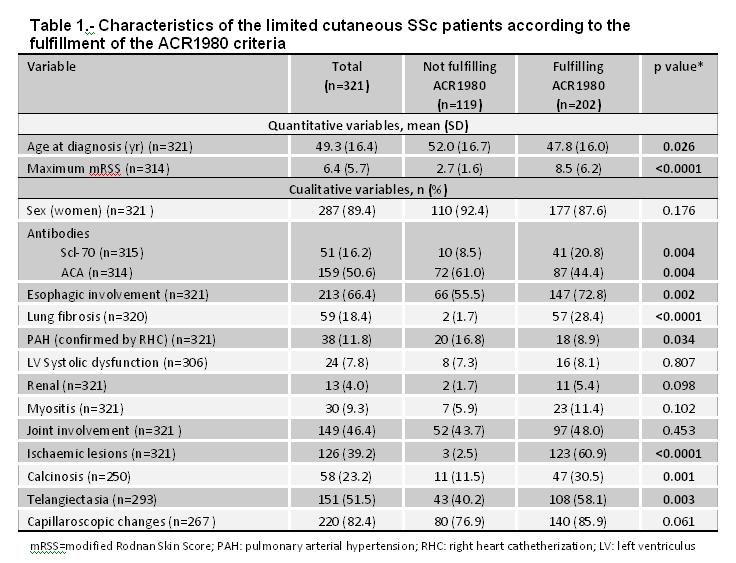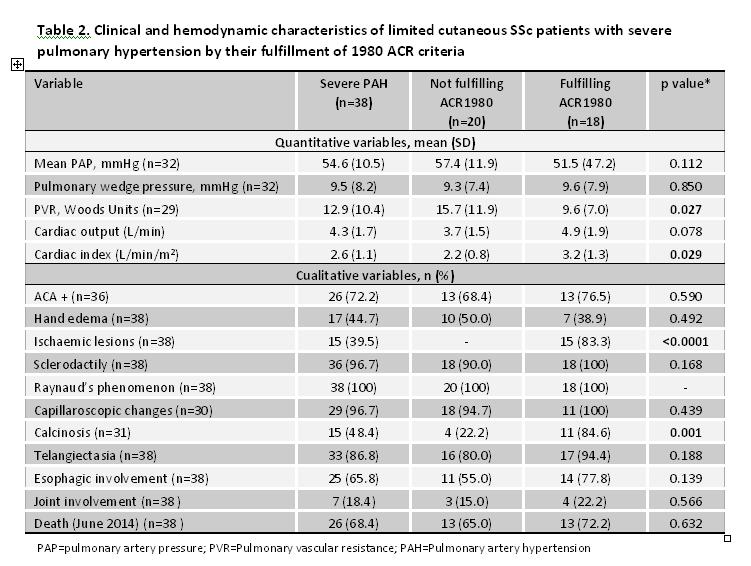Session Information
Session Type: Abstract Submissions (ACR)
Background/Purpose To analyze the performance of the old ACR1980 and the new ACR-EULAR2013 classification criteria for systemic sclerosis (SSc) in patients with limited disease in clinical practice, and to compare the characteristics of patients with severe pulmonary arterial hypertension (PAH) who fulfilled or did not fulfill the 1980 criteria
Methods All patients with clinical diagnosis of limited cutaneous SSc followed in a single center from Jan1990 to May2014 were included. Descriptive analysis and comparisons between groups, according to their performance in new and old criteria, were carried out by parametric or non parametric tests based on the distribution of the variables
Results
From 321 patients, 202 (63%) fulfilled the 1980 and 297 (93%) fulfilled the 2013 criteria. Compared to those fulfilling 2013 criteria only, patients fulfilling 1980 criteria also were younger at diagnosis (48 vs 52 y), presented higher mRSS (8.5 vs 2.7) and had significantly more aScl70, esophagic involvement, lung fibrosis, ischaemic lesions, calcinosis and telangiectasia. In contrast, patients not fulfilling 1980 criteria had more ACA (61 vs 44%) and severe PAH (17 vs 9%) (Table 1).
Within the group of patients with severe PAH (n=38), all fulfilled the 2013 but only 18 (47%) fulfilled the 1980 criteria. Clinical characteristics between those who fulfilled and did not fulfill 1980 criteria were similar, except for higher frequency of calcinosis (85 vs 22%) and ischaemic lesions (83% vs 0%) in the former group. In hemodynamics, patients not fulfilling 1980 criteria had higher pulmonary vascular resistance (16 vs 7) and lower cardiac index (2.2 vs 3.2). Mortality was high in both groups (72 vs 65%)(Table 2)
Conclusion The new SSc ACR-EULAR2013 criteria perform better than the old ACR1980 criteria in clinical practice. Patients with mild symptoms, not fulfilling 1980 criteria, are at higher risk of developing severe PAH, with increased mortality. Our study points out: 1) the need to apply the new criteria to all patients with SSc suspicion; and 2) since SSc-PAH has better prognosis if treated early, all SSc patients, even with very mild disease, should be screened to diagnose PAH as early as possible

Disclosure:
B. E. Joven,
None;
M. J. Garcia de Yebenes,
None;
P. Escribano,
None;
E. Loza,
None;
M. J. Ruiz-Cano,
None;
C. Jimenez Lopez-Guarch,
None;
L. Carmona,
None;
P. E. Carreira,
None.
« Back to 2014 ACR/ARHP Annual Meeting
ACR Meeting Abstracts - https://acrabstracts.org/abstract/performance-of-the-old-acr-and-the-new-acr-eular-systemic-sclerosis-classification-criteria-in-patients-with-limited-cutaneous-disease-effect-on-the-ascertainment-of-severe-pulmonary-arterial-hyperte/
